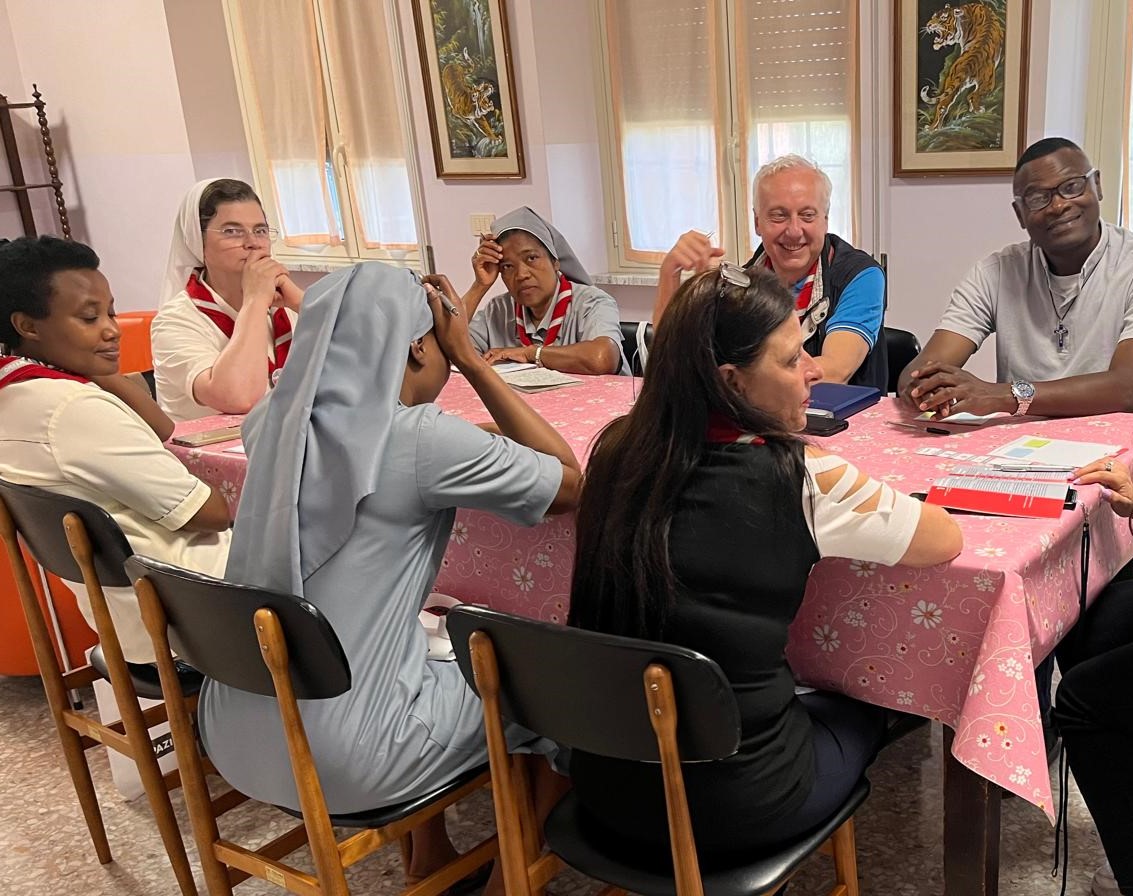
Rome’s Training? An Added Baggage of Humanity and Spirituality
After meeting spazio + spadoni and doing the training in Rome, I feel the need to write to share my impressions and feelings
“If one is hungry, do not give him a fish, but teach him to fish.” We have often heard this phrase. Almost all of us, I think, think it is sensible and right. The problem is how to translate this wise maxim into practice.
spazio + spadoni, particularly in the person of its seniors, has bravely set out on this path with a variety of initiatives, with the understanding that helping those who help people in need (the poor, the sick, the imprisoned, the doubters, the souls of the dead, etc.) is perhaps wiser than simply distributing part of one’s budget directly to the needy.
Of course, it is a longer, uphill, winding road. “Linkers” must be identified to coordinate the “Ambassadors” of the works of mercy, corporal and spiritual, and dealing with human material, with concrete people, with their needs and difficulties, with their fears and bursting personalities, with their shyness and desire to get involved, with their language or communication difficulties is a delicate, arduous and risky task.
Delicate because each person deserves respect but also often needs spurring and renewal of motivation. Risky because one can and must invest considerable capital (energy, time, management and training skills) without seeing big results or sometimes having to start all over again for having arrived at a dead end.
The training days
In the vacation home of the Religious Ministers of the Infirm, a half-hour train ride from Rome, a three-day event of formation, knowledge, exchange, prayer and friendship took place that will surely leave its mark. Under the wise guidance of the founder, Luigi Spadoni, these days of formation saw religious from various congregations, lay people and couples together who, together with a priest, prayed, reflected, learned, proposed and walked together in the ways the Spirit would gradually show them.
The days were always opened by an hour of morning prayer (Lauds and personal silent prayer) that preceded the celebration of the community Mass, an indispensable oxygen for any gathering that wants to put the Lord Jesus at the center.
Then we were gathered to hear interventions of various kinds: first of all, training on the OPERA M “method,” by which to live and spread the reEvolution of the Works of Mercy, a moment not to be taken for granted. The method, in fact, is often a bit like a container for liquids: not essential, of course, but without which it is often impossible to convey the contents. Whether it is a plastic or glass bottle, a water bottle or a glass, the container becomes important in order to quench one’s thirst with good and indispensable water.
Then we listened to testimonies of religious or lay people who enthusiastically presented their projects, successful or not, large or small, their efforts and dreams, a source of inspiration in each case. In some cases, we experienced together with Selene and Luigi the difficulty of being able to communicate with the different African countries where some of the “HIC SUM” projects are underway, touching the language barriers, the difficulties and the fragility of the Internet, but at the same time the desire to communicate to the world, starting from a remote corner of the planet, the desire to spread to everyone through works of mercy the divine mercy that each of us has received from the God who, in every religion and culture on earth, wanted to present Himself as the Merciful and Pitiful.

Fr. John of Lucca filled a morning illustrating the importance of prayer, with a unique twist: not a long, learned lecture, but a nimble presentation, aided by some slides and group work, in which each person had to rework a prayer based on one of the works of mercy, both corporal and spiritual. Together with a brief moment of insight into how, why and whom to invoke, the first moment identified by Umberto, in the presentation of the method of
OPERA M, this was the space more properly devoted to individual spiritual formation.
The richness of the encounter
The interpersonal encounters of knowledge and deepening, the joyful songs in their native languages, the meals eaten together thanks to the discreet and essential presence of the Sisters Ministers of the Infirm completed the picture of these rich, challenging and hopeful days for our parishes and communities scattered throughout the territory.
Each departed from Rome with an added baggage of humanity and spirituality. Our hearts have been bathed in divine mercy, which is at work, always, in a peculiar way welcoming within us in the first person the account of the difficulties and tribulations faced by some in the attempt to translate into practice the insights that the Spirit of mercy has suggested, in Benin, in the island of Timor, in Rwanda-Burundi, Congo, in India and Latin America, in Syria but also in Sicily, in Puglia, in Liguria or in Tuscany.
And, since it is impossible to keep for oneself the free and merciful love of God, poured into our hearts so that it can be shared, each one starts again with a new and renewed responsibility. With originality, imagination, courage and humble and total trust in the merciful Jesus, each one is called to become a conduit, channel, transmitter, source and container of a multifaceted divine grace that always and everywhere seeks collaborators to spread everywhere the seed of the Gospel and the Mercy of our Triune God.
The awarding of Tutor and Ambassador diplomas, the wearing with love and pride of the red scarf we received are just small signs of a renewed dedication to this commitment, a participation in the very desire of Christ, who wished to set the divine fire of mercy to everyone and everywhere.
Source
Images
